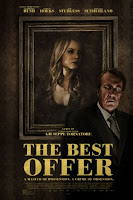Review: The Best Offer (2013)
Review: The Best Offer (2013)
The word “odd” is often used to describe something in a negative way. It’s a rarity that being considered offbeat is complementary; such nomenclature forces a stigma into our minds that can seldom be reversed. Well, that might be the case in real life, but for an artistic film with elements of Hitchcockian intrigue scattered about, it is really the only fitting thing to say. The Best Offer is a film that has flown largely under the radar, released overseas at the beginning of the year, and for the most part, lost on American audiences. Admittedly, it isn’t for everyone, and I suspect most contemporary film-goers would lose interest unless they have something deep within themselves that pines for the strange and hidden aspects of the human condition. For me, those aspects are the most interesting, so I sank into the quicksand of this abnormal story immediately.
Virgil Oldman (Geoffrey Rush) is an art auctioneer/appraiser with a touch of dishonestly coursing through his veins. He routinely withholds information about the true value of the pieces he auctions, though in all other areas of his life, he is rather self-righteous and professional to a fault. His expertise is well-known in the art world, so much in fact that his services are difficult to procure. Out of the blue, an elusive young girl named Claire (Sylvia Hoeks) calls upon Virgil to oversee the auction of a vast collection she has inherited. The few first attempts at meeting go awry, with Claire repeatedly failing to show and concocting a series of transparent excuses for her absence. Virgil becomes increasingly irritated, but soon learns that Claire suffers from Agoraphobia and has chosen to hibernate in a secret room hidden behind a wall in the main living area of her colossal villa. Ironically, Virgil is no stranger to this kind of behavior; he keeps a similar room of solitude in his own house, decorated obsessively with portraits from various periods in art history. Still, he is disturbed by Claire’s refusal to reveal herself, and tries desperately to coax her from seclusion.
As time goes on, Claire’s wall of resistance starts to crumble brick by brick. She begins to regard Virgil as a kindred spirit, perhaps sensing in him the same isolation she has felt her entire life. Virgil has already developed feelings for Claire, no doubt the result of having romanticized her as the only object of beauty he has never seen with his own eyes. His frustration causes him to spy on Claire when she believes no one else is in the house. Once he beholds her in the flesh, his attraction multiplies, becoming an obsession that monopolizes his every waking thought. When he finally meets her face to face, we are drawn further into a surreal landscape where nothing is what it appears.
The Best Offer is a multi-layered trip through a distorted version of reality. Visually, the film reminded me of the old Gothic stories that have permeated our culture, like Wuthering Heights. Here, Claire lives in a massive villa that looks to be suffering from years of neglect. It is surrounded by businesses and other structures, though is somehow still isolated from the rest of civilization. Much like Claire herself, the house is solitary and almost hollow. That the two protagonists in this film are quarantined people who cannot manage to connect with society on anything but a superficial level is no coincidence.
If you watch everything unfold in The Best Offer at face value, you might miss the point. The real depth in this story is one that must be found in the subtle nuances of the atmosphere. It is almost an indefinable quality, similar to a dream that harbors some meaning in a series of random, disconnected images. I suspect different people will derive their own meaning from the plot, as there is a multitude of angles from which the film can be viewed. From my own perspective, I took away a feeling of sadness and despair intermingled with the oddness I mentioned in my opening paragraph. There is something not quite normal about this; it is a world within a world, and if nothing else, it is the perfect conduit for discussion on both the filmmakers’ vision and the pieces of humanity that are lost in the crowd.
The acting here is second to none. Geoffrey Rush personifies the quintessential genius who possesses all the qualities of proficiency and none of the basic abilities to free himself from his weather-beaten heart. His character is so rife with personal regret that falling for a woman with any similarities to him is all but written in the stars. By comparison, Sylvia Hoeks’ Claire is an enigma in an iron fortress, choosing to build a wall to keep the rest of humanity at bay. However, she is also extremely clever, and as the audience will learn, quite adept at creating illusions.
Without divulging more of the secrets in The Best Offer, I leave you the choice of hunting down a copy of this film and walking through it suspiciously. Do not be intimidated by the fact that it’s a foreign production, nor by its arthouse foundation. If you are interested by the gears that turn in all of us, you’ll want to give this one a shot.

